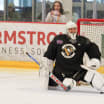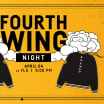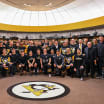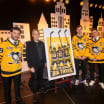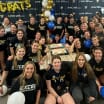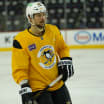Katerina Wu Has Dream Job as Penguins Data Scientist
She is the first woman on the scouting and evaluation side of the team's hockey operations department
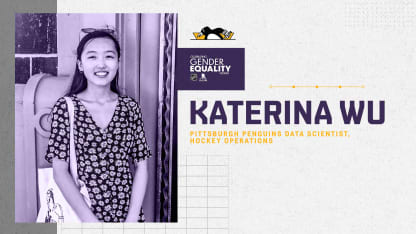
As an economics major with a double minor in statistics and computer science, she certainly had a number of them. She could have applied for an internship with one of the 'Big Four' consulting firms - Deloitte, Ernst & Young, KPMG, and PricewaterhouseCoopers - like many of her classmates. But that didn't appeal to Wu at all, since her heart was in hockey.
As a huge fan of the sport, Wu badly wanted to work in analytics for an NHL team after hearing from Namita Nandakumar, who started her career in 2018 for the Philadelphia Eagles and now works for the Seattle Kraken as the team's senior quantitative analyst. Little did she know that would lead her on the path to being hired as the Penguins' data scientist.
"I had no idea that sports analytics was something I could even do until I heard Namita talk about it," Wu said. "I was like wait - you can do that? That honestly blew my mind."
But even once Wu knew it was a possibility, she still wasn't sure if it was a legitimate opportunity for her.
"At the time, there were only 31 teams, and some of them don't even have a data scientist," she said. "So it was a very limited job field, and I was already competing against a bunch of amazing people."
So Wu looked up various NHL teams to see if they had job openings of any sort, without any luck. She then began researching sports analytics internships, and stumbled across Carnegie Mellon University's Sports Analytics Camp, an eight-week summer program.
"As I was reading through the requirements, my eyes were slowly getting bigger," Wu said. "I was like wait; this is perfectfor me."
Wu immediately applied, but didn't have much hope, as it was already approaching the end of the semester. She prayed every day that she would get an acceptance email, saying the process felt more stressful than applying to colleges. Fortunately, that email eventually arrived, and turned out to be a life-changing one - as it set Wu on the path to achieving her dream.
At the camp, Wu was paired with the Penguins' Sam Ventura, the team's director of hockey operations and hockey research, and Nick Citrone, senior data scientist of hockey and business operations.
Wu and Ventura continued working together over the 2019-20 season, and stayed in touch over the summer while she interned with SportsMEDIA Technology (SMT), the company that provides the NHL with the new puck and player tracking data that was first introduced at the 2020 NHL All-Star Game.
So when the Penguins were looking for someone to help them work with those data sources so that they could remain at the forefront of the league as part of the organization's commitment to being forward-thinking and investing in the future, Wu turned out to be the perfect fit for a number of reasons.
As Ventura said, Wu is uniquely qualified to work in hockey due to her expertise in sports analytics, her impressive technical skillset, her knowledge of the game, and experience working with that puck and player tracking data.
"We knew what her skills were, and then she had this added benefit of being one of the only people on the planet who had actually worked with the data," Ventura said. "We also happened to have a great relationship with her already."
Wu, 22, is now the first woman on the scouting and evaluation side of the Penguins hockey operations department and the first Asian-American woman, bringing a diverse set of viewpoints that are incredibly valuable. And just as Nandakumar inspired her, Wu will be doing the same for the next generation of women and girls who want to work in sports.
"The reason we hired her was because she was the best person for the job," Ventura said. "Separate from that, I think it's fantastic that any woman is working in hockey operations, because it serves as a reference point and an inspiration for other women and girls who are in high school and college and looking at the opportunities they might have in their careers in the future. And when they see someone like Katerina or Namita and Alexandra Mandrycky in Seattle, they can say, look - this is a real, viable path for me."
Wu joins the women at every level of the Penguins who are breaking barriers and blazing a path from the top on down, highlighted by the growing number of women executives in the organization. Vice President of Communications Jen Bullano Ridgley was the first female executive at the Penguins, and has since been joined by Jenny Darling, Chief Financial Officer; Tracey McCants Lewis, Vice President, Human Resources and Deputy General Counsel; and Andi Perelman, Vice President, Digital.
\\
Wu's propensity for analysis runs in the family, as her father was a research scientist. She spent most of her early childhood traveling across Asia and Europe as he worked at different labs.
Wu said that moving around so much and having to immediately reset herself into new environments prepared her for relocating to the eastern coast of the U.S. with her family. They remained there for a while before eventually settling in Boulder, Colorado, where Wu attended middle school and high school.
"There were definitely times where I didn't feel like I fit in right away," she said. "Especially in light of recent events, I never realized how sometimes I was the only Asian person or the only woman in a room until I would look around. It definitely shaped my experience and helped prepare me for that in a way."
After Wu moved back across the country for college - spending one year at the College of William & Mary before transferring to UNC - she would put on hockey games for background noise, as they reminded her of Boulder and helped alleviate bouts of homesickness.
Wu tried playing hockey for a stretch, but at just 5-foot-2, "my friend checked me once and I flew halfway down the rink, so it's probably not smart for me to play," she said with a laugh. So she prefers to watch, enjoying the contrast between that physicality she experienced firsthand and the finesse that's on display when a beautiful goal is scored, like the one Bryan Rust potted last week.
So whenever professors would let Wu and her fellow students choose projects, hers would always be on hockey. "No matter what class it was for, that was my go-to topic," she said with a laugh. She began applying methods learned in the classroom to outside of the classroom as well.
Wu's best friend is a Blackhawks fan from Chicago, and once she got interested in hockey, they would watch games together as a way to stay connected after going off to college. One day, Wu was telling her about a classmate, a Bruins fan from Boston, who insisted that the Blackhawks didn't have a chance of making the playoffs.
"I was telling my friend how angry I was that he said that," Wu recalled. "And then she was like, they do, we have to believe in them. And I was like yeah, but no one cares about our feelings (laughs). I was like, I'll mathematically prove it to him."
It just so happened that in Wu's statistics class, they were learning about something called the Monte Carlo simulation, so she used that to estimate the actual probability of the Blackhawks advancing.
"I ran that in Excel, and it was very basic stages, but it said that the Blackhawks had a chance of making it to the playoffs," she said. "I pulled up my spreadsheet like see, I told you. And then they didn't (laughs)."
Wu continued pursuing her interests in hockey analytics in other various ways until that fateful summer of 2019.
At the CMSACamp, Wu was given lots of assignments that solidified her passion for the field. When it came time for their capstone projects, the students were told they could list their top-five sports in order of preference.
"I was like, if I just put hockey and don't list any other sports with that, would that come off as a bad thing to do?" she said with a laugh. "But I was just really, really wanted hockey. So I put it in size 72 font. The other sports, I was like, I don't want to put them. Just know they're there."
That led to Wu and her partner Madeline Gall getting matched with Ventura, Citrone and the Penguins for a project on*adequately assessing the quality of a player's performance across different leagues. Wu and Gall introduced a new method for both comparing and projecting that metric.
"We brought a problem, and they invented a solution," Ventura said. "That's often the hardest thing for Nick and me. We know what our problems are, but then figuring out a solution that's innovative and accounts for everything we're trying to account for is the challenging part. I think Katerina and Maddie did a really great job of that."
As the camp was coming to a close, Wu applied to the Hockey Graphs Mentorship Program, where the aim is to inspire people from various backgrounds - especially those who are underrepresented - to contribute to the hockey analytics community and increase its diversity.
Ventura has been a mentor for the program since it started, and when the director gave him a list of the people who had been accepted, he asked to continue working with Wu.
"At the end of the summer, the work was somewhat complete, but they hadn't written it up or anything or presented it anywhere," Ventura said. "So being paired together for Hockey Graphs was nice, because it allowed us to polish it and get it to a point where she could present it to the world, and everyone could see and understand how brilliant of an idea it was that they had."
Wu did just that in November of that year at the 2019 Carnegie Mellon Sports Analytics Conference, where she was the co-winner for Best Research Poster. She also presented the project at the Columbus Blue Jackets Hockey Analytics Conference the following February.
That's where Wu got in touch with Andrew Thomas, the professor who had mentored Ventura when he was a student at CMU before they co-founded the hockey analytics website War-on-Ice. Thomas is now the director of data science at SMT, and after Wu came on board as an intern, they worked together automizing certain functions for the puck and player tracking data.
While Wu was certainly heading in the right direction when it came to her career path, she continued to harbor doubts about doing hockey analytics for a living - especially after being offered a data analyst position in real estate. And during a conversation with Ventura, she told him about the opportunity.
"He said, you don't sound very happy about it," she said. "And I said, I guess that's because I wanted to work in sports, but this is a good job offer. Then Sam gave me this really great pep talk and I really internalized it. Like okay, you're right, sports is what I want to do. I'll tell this job no thank you, I appreciate the offer, but I'm going to continue pursuing sports."
It absolutely turned out to be the right decision.
\\\
For the first few weeks of her job with the Penguins, which she is currently working remotely from North Carolina, Ventura and Citrone got Wu up to speed on their own projects and what they've already set up with the organization.
They also introduced her to people like Erik Heasley, the assistant GM of Wilkes-Barre/Scranton and manager of hockey operations, who told her what scouting process looked like from both a qualitative and quantitative perspective; and Penguins strength and conditioning coaches Alex Trinca and Alexi Pianosi, who shared the sports science perspective.
But Wu's main duties revolve around designing and implementing new statistics to evaluate player and team performance with the player and puck tracking data.
"Before, we weren't able to provide as much context for each player with the play-by-play data that the NHL provided," Wu explained. "Now, we know exactly what's happening for each player on the ice at all times. And that's really helpful in creating more robust statistics for having all this additional context now for each player."
For example, Penguins fans are familiar with the feeling of chagrin that comes after watching one of the players pass instead of shoot. It's part of Wu's job to find the reasons that might have went into that decision.
"You're like oh my gosh, why didn't he just shoot, right?" Wu said with a laugh. "That's always the reaction people have. But taking things into context, what if there are players right in front of the net, and there are too many people within your lane? Or if there are no players in front of the net, and you don't have a screen in front of the net? Those are reasons that might affect why you didn't shoot."
While Wu is obviously talented at the coding aspect, Citrone is impressed with her ability to communicate her findings.
"To do something complex and be able to explain to someone who doesn't have the same background as you and have them really understand why you're doing the things you're doing and why the numbers make sense, that's a really important skill too," Citrone said. "I think that she's just very qualified in every aspect of the job."





